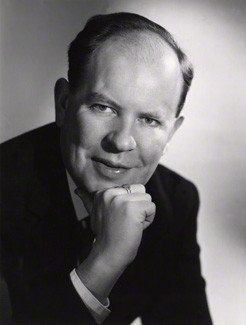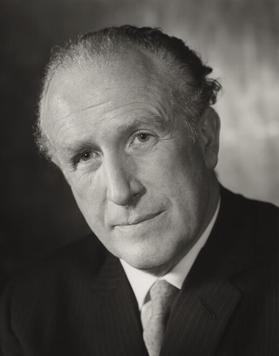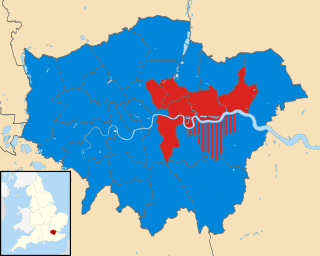Related Research Articles

The Greater London Authority (GLA), colloquially known by the metonym "City Hall", is the devolved regional governance body of Greater London, England. It consists of two political branches: the executive Mayoralty and the 25-member London Assembly, which serves as a means of checks and balances on the former. Since May 2016, both branches have been under the control of the London Labour Party. The authority was established in 2000, following a local referendum, and derives most of its powers from the Greater London Authority Act 1999 and the Greater London Authority Act 2007.

The Greater London Council (GLC) was the top-tier local government administrative body for Greater London from 1965 to 1986. It replaced the earlier London County Council (LCC) which had covered a much smaller area. The GLC was dissolved in 1986 by the Local Government Act 1985 and its powers were devolved to the London boroughs and other entities. A new administrative body, known as the Greater London Authority (GLA), was established in 2000.

The Inner London Education Authority (ILEA) was the local education authority for the City of London and the 12 Inner London boroughs from 1965 until its abolition in 1990. From 1965 to 1986 it was an ad hoc committee of the Greater London Council; on 1 April 1986 it was reconstituted as a directly elected body corporate.

Reginald Ernest Prentice, Baron Prentice, PC was a British politician who held ministerial office in both Labour and Conservative Party governments. He was the most senior Labour figure ever to defect to the Conservative Party.
Sir Reginald Eustace Goodwin CBE, DL was a British politician. He was Leader of the Greater London Council from 1973 to 1977. On the moderate wing of the Labour Party, he favoured public control of utilities.

Sir Horace Walter Cutler was a British Conservative politician who served as leader of the Greater London Council from 1977 to 1981. He was noted for his showmanship and flair for publicity and was, in several ways, a forerunner of Thatcherism.

Arthur Desmond Herne Plummer, Baron Plummer of St Marylebone, TD, DL, FRSA was a British Conservative Party politician in London and the longest serving Leader of the Greater London Council 1967–1973.

The first election to the Greater London Council (GLC) was held on 9 April 1964.

The second election to the Greater London Council was held on 13 April 1967, and saw the first Conservative victory for a London-wide authority since 1931.

The third election to the Greater London Council was held on 9 April 1970 and saw a Conservative victory with a reduced majority.

The fourth election to the Greater London Council (GLC) was held on 12 April 1973. Labour won a large majority of 58 seats to 32 for the Conservatives; the Liberals also won their first two seats on the council.

The sixth election to the Greater London Council (GLC) was held on 7 May 1981. Following the election Andrew McIntosh the leader of the Labour Group was replaced by Ken Livingstone, a member of the party's left-wing. This was the last election to the GLC. The Conservative government of Margaret Thatcher soon took the decision to abolish the council in the mid-1980s. Following the abolition of the GLC, there was a direct election to the Inner London Education Authority in 1986.
Ronald Leighton was a British Labour Party politician.

Kenneth Robert Livingstone is an English former politician who served as the Leader of the Greater London Council (GLC) from 1981 until the council was abolished in 1986, and as Mayor of London from the creation of the office in 2000 until 2008. He also served as the Member of Parliament (MP) for Brent East from 1987 to 2001. A former member of the Labour Party, he was on the party's hard left, ideologically identifying as a socialist.
The Social Democratic Alliance (SDA) was a political organisation in the United Kingdom. Founded in 1975 as an anti-communist group within the Labour Party, it was dissolved following the establishment of the Social Democratic Party in 1981.

The rate-capping rebellion was a campaign within English local councils in 1985 which aimed to force the Conservative government of Margaret Thatcher to withdraw powers to restrict the spending of councils. The affected councils were almost all run by left-wing Labour Party leaderships. The campaign's tactic was that councils whose budgets were restricted would refuse to set any budget at all for the financial year 1985–86, requiring the government to intervene directly in providing local services, or to concede. However, all fifteen councils which initially refused to set a rate eventually did so, and the campaign failed to change government policy. Powers to restrict council budgets have remained in place ever since.

Fares Fair was a public policy advocated by the Labour Party administration of the Greater London Council (GLC), then led by Ken Livingstone. The policy of low public transport fares was implemented in 1981, but was later ruled to be illegal in the courts and rescinded the following year.
The Greater London Council leadership of Ken Livingstone refers to the period during which Ken Livingstone, a British Labour Party politician, was Leader of the Greater London Council (GLC). Livingstone took up the post on 17 May 1981, and remained in office until the GLC was abolished on 1 April 1986.

Illtyd Harrington was a British Labour Party politician who served as deputy leader of the Greater London Council (1981–84) and then subsequently as chairman (1984–85). He was a political ally of Ken Livingstone.
Paddington was an electoral division for the purposes of elections to the Greater London Council. The constituency elected one councillor for a four-year term in 1973, 1977 and 1981, with the final term extended for an extra year ahead of the abolition of the Greater London Council. Ken Livingstone, the leader of the Greater London Council from 1981 to 1986, was elected from the division in 1981 and at a by-election in 1984.
References
- ↑ The Municipal year book and public services directory. Municipal Publications Ltd. 1986. p. 768. ISBN 978-0-900552-43-4.
- ↑ Nally, Michael (29 June 1975). "Plucky Reg Squares up to a losing fight". The Observer. p. 2.
- 1 2 Geoff Horn, "Crossing the Floor: Reg Prentice and the Crisis of British Social Democracy", Manchester University Press, 2013, p. 106.
- ↑ London Borough Council Elections 13 May 1971 Archived 22 August 2013 at the Wayback Machine , Greater London Council 1971, p. 51.
- ↑ Hilary Wainwright, "Labour: a tale of two parties", Hogarth Press, 1987, p. 17.
- ↑ Clare, John (20 July 1975). "Moderates turn on Prentice". The Observer. p. 16.
- ↑ Geoff Horn, "Crossing the Floor: Reg Prentice and the Crisis of British Social Democracy", Manchester University Press, 2013, p. 96.
- ↑ Greater London Council Election 5 May 1977 Archived 22 August 2013 at the Wayback Machine , Greater London Council 1977, p. 7.
- ↑ Marks, Laurence (10 July 1977). "Newham fight takes new turn". The Observer. p. 2.
- ↑ Boothroyd, David. "Greater London Council Election results: Newham". United Kingdom Election Results. Archived from the original on 24 March 2016. Retrieved 8 October 2023.
- ↑ Carvel, John (3 August 1984). "Livingstone quits–with a touch of nerves". The Guardian. p. 2.
- ↑ Clayton, Hugh (3 August 1984). "Livingstone quits and GLC wrangles begin". The Times. p. 2.
- ↑ Clayton, Hugh (20 September 1984). "Victory roll for Ken - on a hollow drum?". The Times. p. 12.